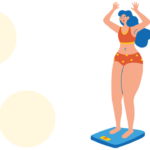
To ward off infectious diseases, including cases of COVID-19, we are often told to eat right, exercise regularly – and come from a lucky gene pool! Well, one more thing we can do for ourselves is getting regular, restorative sleep.
CNBC reports that:
50 million Americans experience some sleep disorder.
1 in 3 adults in the U.S. get fewer than the recommended seven hours of sleep per night.
None of this is good for maintaining a healthy immune system, and here’s why. Sleep problems and lack of sleep create inflammation in the body, which is linked to obesity and depression, as well as increased rates of hypertension, heart disease, diabetes, and cancer.
CNBC columnist Dr. Heather Moday suggests creating an environment conducive to sleep to improve your nightly ritual. This includes blocking out light (even indicator lights on bedroom electronics), quieting outside noise with a white-noise generator, and keeping the room at about 65 ˚F (18.3 ˚C). Then prepare for sleep each night by setting aside digital devices and journalling or doing breathing exercises to calm the mind. Adding some easy stretches further aids relaxation and engages your parasympathetic nervous system.
If you’re not already supplementing with magnesium, try taking some before bed for its sleep-enhancing properties, or get it through the skin in a warm Epsom salt bath. Try wearing blue-light-blocking glasses to ensure your body is making the necessary melatonin to prepare you for sleep. These yellow or amber lenses block the blue part of the light spectrum in artificial light and digital devices, preventing your brain from thinking, “it’s daytime, time to be awake!”
Magnesium for the Win!
Looking for a new reason to consider supplementing with magnesium?
That is, something other than wanting better sleep, a healthier heart, and a new way to fight stress and improve mood. From our friends at DoctorMurray.com, we learn that magnesium also boosts energy levels, especially for the vast majority of us who aren’t getting enough magnesium from our diets.
This link to improved energy could be excellent news for people who experience chronic fatigue or even more general feelings of sluggishness. People whose work or exercise routine includes significant perspiration should also consider magnesium supplementation because sweating quickly depletes our already-low magnesium supplies.
Are you interested in adding magnesium to your routine?
As Dr. Murray recommends, start by trying 300 mg at bedtime for a month and see how you feel. Taking magnesium before bed will not keep you up, in fact, it will help you sleep. And over time, you will reap the benefits of more energy throughout the day. While the mineral comes in various forms, such as magnesium citrate or bisglycinate, most digestive systems will tolerate both.
Natural Factors offers magnesium bisglycinate in convenient 200 mg vegetarian capsules and powder, or magnesium citrate in a delicious, sugar-free berry powder. Both delivery systems provide the recommended energy-enhancing mineral.














